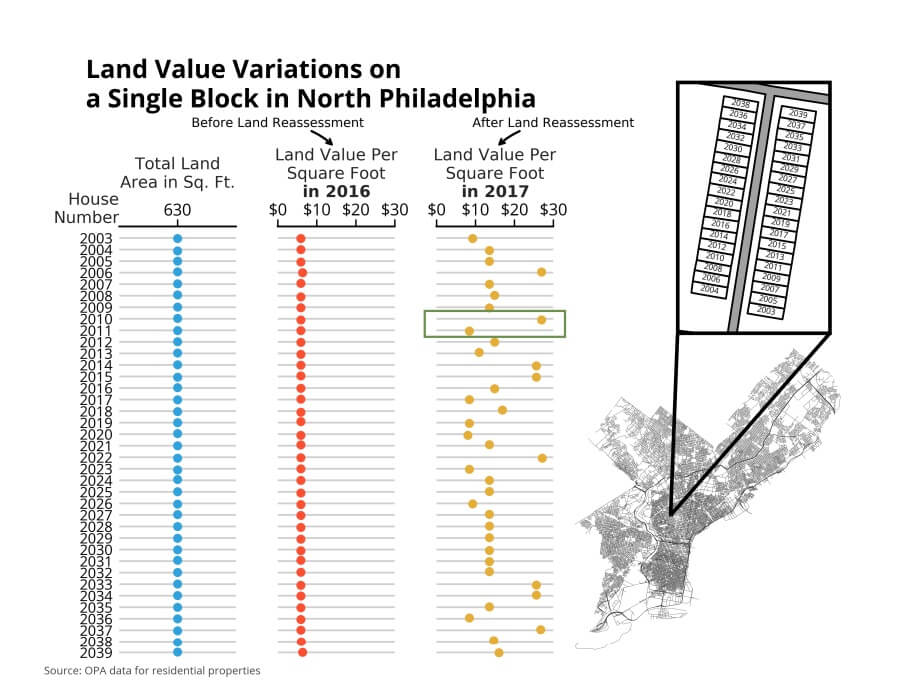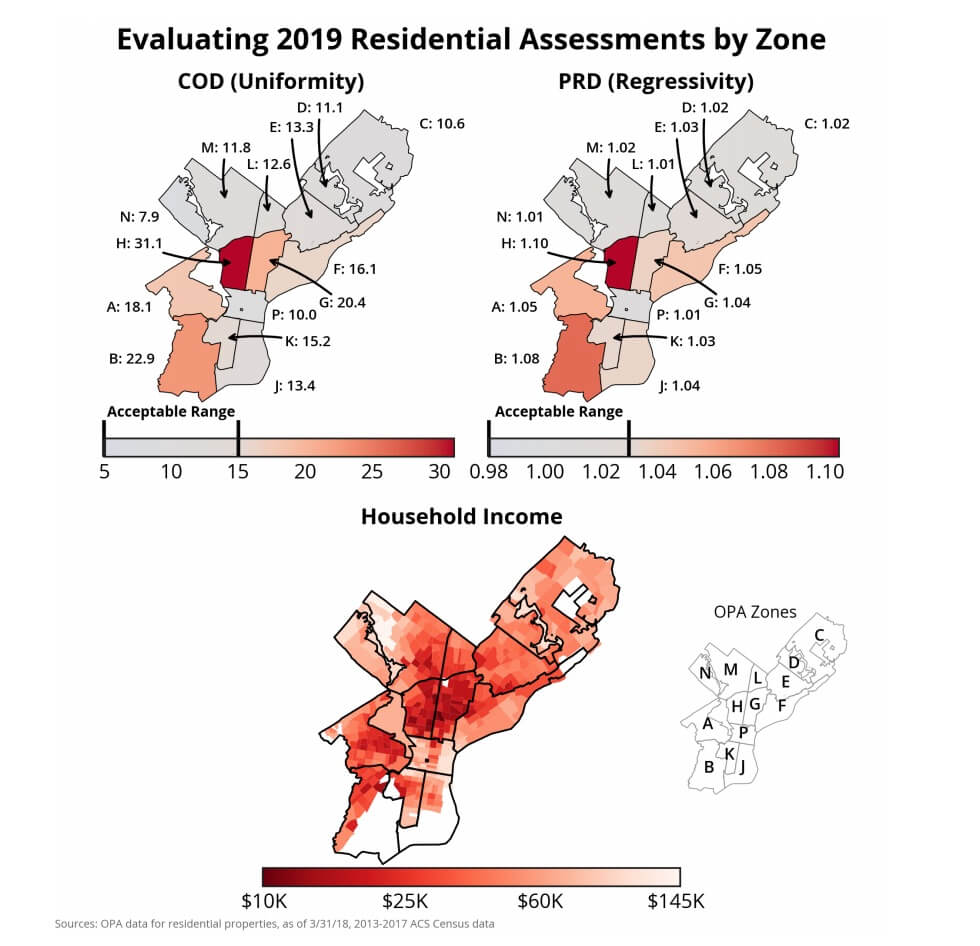Why postponing real estate reaassessments could be bad for Philadelphia
New Year, No New Taxes
The City plans to concur off on irresolute what property owners pay in taxes for another year. Philly 3.0'south engagement manager on why that may not be expert for anyone
Sep. xiv, 2020
The Kenney administration announced this week that the City volition postpone real manor reassessments for an boosted twelvemonth, after also postponing last twelvemonth'south reassessments, citing the impending Computer-Assisted Mass Appraisal (CAMA) system rollout and Covid-related complications as compelling reasons to delay marker assessed values to marketplace.
The administration is all the same searching for a new master assessment officer for the Role of Property Assessment (OPA) afterwards their lead assessor Michael Piper came nether heavy scrutiny from City Council and members of the public following the concluding circular of assessments. And the urban center is withal proverb their (CAMA) is but around the corner. Merely information technology'southward been been saying that for years.
The few places where market values take been apace rising will welcome a temporary reprieve from accurate assessments, but this decision also has some big downsides.

Commencement, information technology's non the case that everybody's assessments have gone up—there are some neighborhoods where property values have all the same been dipping, and this determination means that property owners in those areas will have been overpaying belongings tax bills multiple years in a row, with no anticipation of redress when the actual values are finally recorded.
Urban center Controller Rebecca Rhynhart released an analysis of the fairness and accuracy of holding assessments in January 2022 and plant that lower-income areas of Philadelphia were more probable to be over-assessed as a result of policy choices at OPA.

Secondly, the Kenney administration is only creating a political headache for itself next year, when people will encounter the final 3 years of value appreciation show up all at once in their tax bills after the next assessment.
This has caused a lot of defoliation and anger whenever OPA'south taken a few years off at a time, and the politics can get ugly.
There'southward a lot to unpack with reassessment politics, but a big part of the issue is that nobody likes seeing their taxes go up, and some of the complaints you hear about inaccurate assessments are really complaints about accurate assessments.
This decision means that property owners in some areas volition have been overpaying belongings taxation bills multiple years in a row, with no anticipation of redress when the actual values are finally recorded.
If residential price growth stays on its current trajectory, people who are upset about property taxes going up every year in appreciating neighborhoods aren't going to be happier under a more than brutally accurate CAMA assessment system either.
![]() It's true that OPA's accuracy has declined over the last couple rounds, according to the controller's analysis, and this has to do with the amount of deviation from the accepted accuracy range that'due south considered standard amidst assessors, and as well how OPA chooses to assess vacant state, tax-abated backdrop, and state underneath underutilized backdrop like motorcar body shops and strip malls in affectionate areas, which has contributed to a lot of the weird same-block variation in country values that many people take observed over the years.
It's true that OPA's accuracy has declined over the last couple rounds, according to the controller's analysis, and this has to do with the amount of deviation from the accepted accuracy range that'due south considered standard amidst assessors, and as well how OPA chooses to assess vacant state, tax-abated backdrop, and state underneath underutilized backdrop like motorcar body shops and strip malls in affectionate areas, which has contributed to a lot of the weird same-block variation in country values that many people take observed over the years.
According to some unofficial analyses, the amount of potential revenue forfeited as a upshot of these policies since 2022 totals in the loftier hundreds of millions, so this isn't only an academic business concern.
THIS ARTICLE IS PART OF A CONTENT PARTNERSHIP WITH:

![]() Unfortunately, City Council'due south interest in this state of affairs recently has more often than not involved calling for policy changes that would make the assessments even less authentic, and increase the difficulty of marking belongings values to market place. That's too bad, since they've besides played an important and productive role on this outcome in the recent past that they should endeavour to reprise.
Unfortunately, City Council'due south interest in this state of affairs recently has more often than not involved calling for policy changes that would make the assessments even less authentic, and increase the difficulty of marking belongings values to market place. That's too bad, since they've besides played an important and productive role on this outcome in the recent past that they should endeavour to reprise.
In advance of the Actual Value Initiative in 2013, which finally got Philadelphia onto a regular reassessment schedule later some earlier litigation, Quango passed a raft of programs to protect longtime homeowners, low-income homeowners, and seniors from big jumps in their property bills.
A new paper from researchers at the Philadelphia Fed and Stanford University from April 2022 found those programs were wildly successful, and establish "no sign of a large-scale deviation of elderly or longterm homeowners in gentrifying neighborhoods within five years afterward adoption of the new policy."
Nether the circumstances, information technology would be much better for Council to spend its time looking for ways to shut any remaining gaps in this organization rather than moving abroad from the AVI concept of regularly marking assessments to current market values.
Issues like tangled titles for inherited backdrop—and incomplete participation stemming from the requirement that people utilize for these programs instead of being automatically enrolled—could be fixed to make the practical effects of our property tax arrangement much less regressive, while continuing to collect on real market place values from people who tin ameliorate afford to pay.
Jon Geeting is the managing director of engagement at Philadelphia 3.0 , a political action group that supports efforts to reform and modernize Metropolis Hall. This is role of a series of articles running on both The Citizen and 3.0's weblog .
Header photo past Jon Seidman / Flickr 



Source: https://thephiladelphiacitizen.org/postponing-real-estate-reassessments-philadelphia/
0 Response to "Why postponing real estate reaassessments could be bad for Philadelphia"
Post a Comment